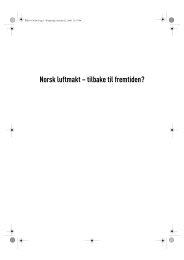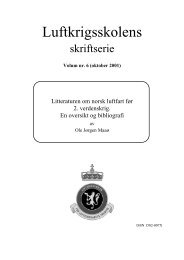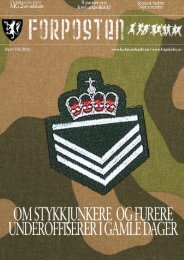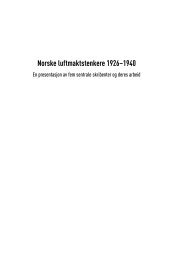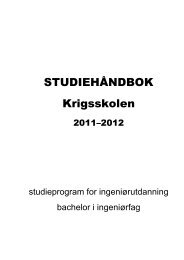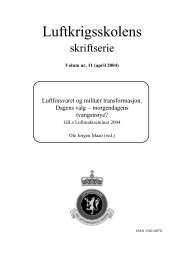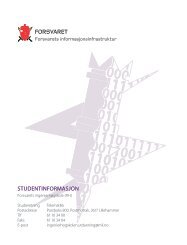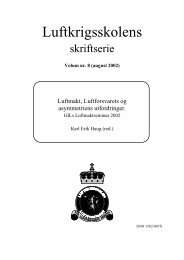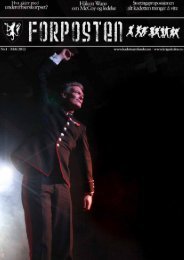Wilhelm Mohr
Wilhelm Mohr
Wilhelm Mohr
Create successful ePaper yourself
Turn your PDF publications into a flip-book with our unique Google optimized e-Paper software.
PART IV – 9 April – From the Past to the Future<br />
element of repetition. Guttorm Hansen 35 once said that ’it was a fear of<br />
committing ourselves – we thought we could steer clear – we were still people<br />
living on the outskirts, despite the experiences with the losses of the Merchant<br />
Fleet during WWI. In a way the reality of the world had not yet become our<br />
reality’. Nordahl Grieg 36 states: ’we built upon peace almost in defiance’.He<br />
idealizes us. Rather, it could be argued that, with closed eyes and switched<br />
off senses, we clung to peace as almost in defiance.<br />
I am not one of those who blame the Labour Party for all that happened<br />
leading up to 9 April. We have a society, such as it is, and that<br />
was the case back then as well, but it should not have got off too easily<br />
either. The consequences were too grave for that, and many of our<br />
lessons learned are bound to this particular phase.<br />
The inter-war period had seen a social development of our society<br />
that I do understand. There had been high unemployment rates for a<br />
significant period of time. The Labour Party’s representatives had been<br />
elected on a platform of economic crisis and social politics, and not<br />
because of defence matters or foreign policy credentials. The downsizing<br />
of our Defence Forces was a declared policy, and the Mot Dag<br />
movement was influential. Scepticism towards everything military, and<br />
towards officers in particular, was deep. There was a perception that<br />
funding defence-related objectives was not only non-productive and<br />
unnecessary, but also stood in direct contrast to the broader development<br />
of our society that would bring hope for the future. There was<br />
a prevailing sense that this view had support from the majority of the<br />
elected members of Parliament. So the way for such a political agenda<br />
was clear when the Labour Party took office in 1935, but we should be<br />
aware that the huge downsizing of the Armed Forces came in the years<br />
1932 and 1934, during the Mowinckel- and Hundseid administrations<br />
35 Guttorm Hansen was an author, and also a Labour Party member of the Norwegian Parliament.<br />
He was Stortingspresident (President of the Norwegian Parliament) 1973–1981.<br />
36 Johan Nordahl Brun Grieg (1902–1943) was a famous Norwegian journalist, author and<br />
poet. He was granted the possibility to join an Allied bombing mission in late 1943, and<br />
was subsequently killed during this mission when the Germans shot down his Lancaster<br />
over Berlin on 2 December 1943.<br />
105




